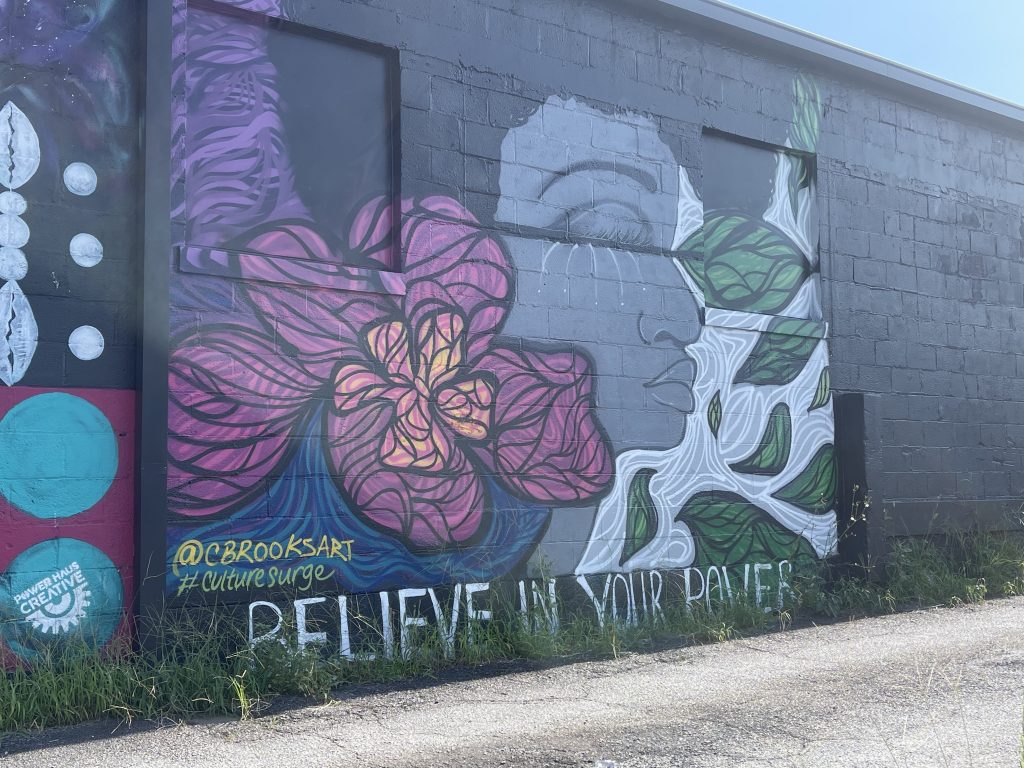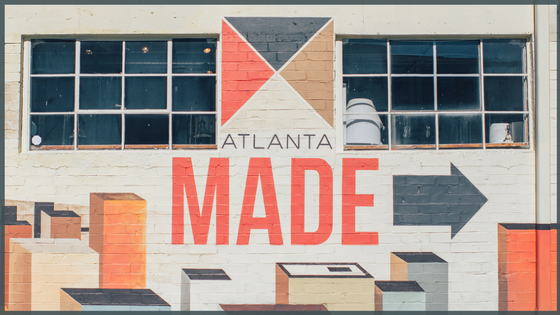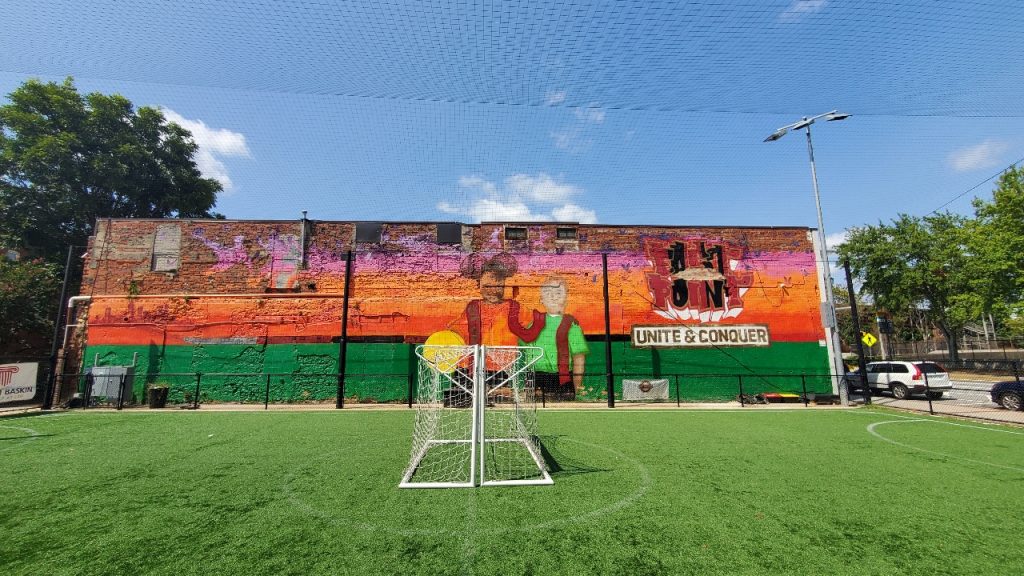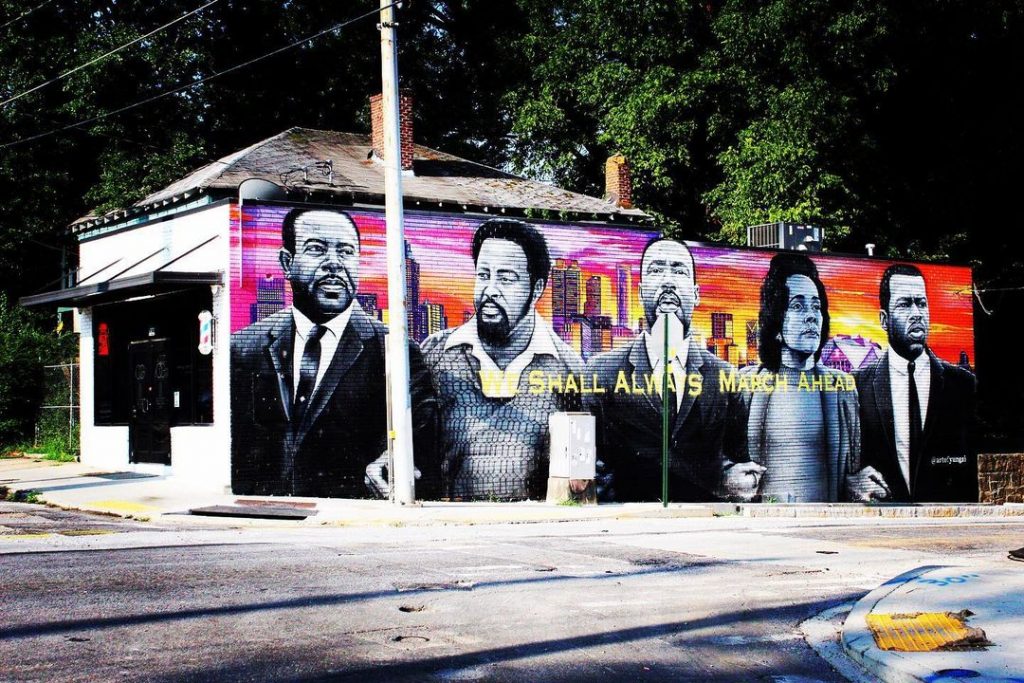
Atlanta is a city of the future with deep ties to the past. The red clay hills of Atlanta, Georgia hold within them weighted history. Despite its modern look of towering skyscrapers and state-of-the-art facilities, the shadows of slavery still loom large. You can visit Sweet Auburn once known as “the richest Negro street in the world” and then take a short drive to Stone Mountain Park to see the nation’s largest Confederate monument.
This city has seen many contradictions – from being a pivotal battle during the Civil War to being the cradle of the Civil Rights Movement. The city burned during the Great Atlanta Fire of 1917 and saw boxer and activist Muhammad Ali triumphantly light the Olympic flame almost 80 years later. The Ku Klux Klan would organize its second cohort in Georgia and yet Atlanta quickly became a center of Black education with some of the country’s most noted Historically Black Colleges and Universities including Morehouse College, Spelman College, Clark Atlanta University, and Morris Brown College.
Once known as “the city too busy to hate,” Atlanta became central to the establishment of Black political power while also dealing with the terror of the Atlanta child murders. It has seen massive expansion that made it an international city and gentrification that left its residents displaced.
Through good and bad, the city continues to move forward at a break-neck pace trying to build an ecosystem that works for all people – especially Black and brown folks, invests in the life of the space, and fosters joy, pleasure, and rest within the community.

Railroad Ties
In 1836 the Georgia General Assembly voted to build the Western and Atlantic Railroad positioning Atlanta as a major transportation hub of the south. Today, the fast-growing city remains a hub of transportation, but you can often find the city in crippling gridlock traffic while those who don’t have cars can’t access public transportation to move around the city. This illustrates the challenge and opportunity of Atlanta. For some, there is a great opportunity, for others stagnation. SPARCC saw in Atlanta an opportunity to make a significant impact.
The city ranks third in the number of Fortune 500 corporate headquarters. However, in studies of the 50 largest metropolitan areas in the U.S., Atlanta is consistently ranked last or nearly last in income mobility. A child raised in the bottom fifth of incomes in Atlanta has just a 4 percent chance of reaching the top fifth due to lack of opportunities in the communities where they are raised.
There are an estimated 328,000 “housing insecure” households in metro Atlanta, meaning people pay more than 50 percent of their income on housing and transportation costs. Nationally, Atlanta ranks 91st out of 100 of the largest metro regions for job access via public transportation, with only 3.4 percent of jobs accessible by a 45-minute public transit commute or less.
Atlanta continues to be shaped by the historical impact that structural racism and discriminatory policies at the federal and local levels have played in the region. Investment and growth have favored the majority white neighborhoods to the north of Interstate 20, and concentrated poverty in the predominantly black neighborhoods to the south. The median household income is $25,384 for black households and $80,993 for white. This dynamic is connected to and reinforced by geography, concentrated poverty, extensive traffic, and an inadequate public transit system that makes it extremely difficult to access job opportunities.
“The South Got Somethin’ To Say”
At the 1995 Source Awards Andre 3000 of the Atlanta Hip Hop duo Outkast boldly declared to his peers and a national television audience, “…the south got somethin’ to say!” From that point, Outkast went on to reshape and redefine not only Hip Hop but music as we knew it. His statement was not only prophetic for music but how Atlanta would become the epicenter of so many things from that point forward – music, entertainment, sports, arts, culture, and most recently politics with Georgia putting President Joe Biden over the top and turning the state Democrat blue for the first time in nearly 30 years since the 1992 election of President Bill Clinton.
With several new ventures including the newly minted Tyler Perry Studios and numerous residential and commercial projects, SPARCC felt Atlanta was a prime area to incorporate their initiative to provide investment in the growing city without displacement and help preserve the rich culture that is ATL (Shawty). SPARCC worked with the Atlanta Transformation Alliance to identify projects where they could make the greatest impact:

Soccer in the Streets
Unused space at the heart of the community near transit stations provided an opportunity to create space for community youth and parents to gather. Soccer in the Streets received grant funds from SPARCC to assist with the cost of building soccer fields near two MARTA stations. The projects are part of an expansion of Station Soccer – soccer leagues built around the metro transit network by developing underutilized spaces in and around transit stations. The fields break barriers of entry including transportation and affordability. Additionally, children have the opportunity to learn life skills as well as build an active lifestyle.
Culture Resilience Environment Workforce (CREW)
In 2019, Southface and its partners launched the Atlanta CREW (Culture-Resilience-Environment-Workforce) project. It was established in response to Southwest (SW) Atlanta community challenges related to stormwater management, economic opportunity, and community displacement. Community outreach and engagement supported the recruitment of 108 applicants from the primary focus area of SW Atlanta and the Utoy Creek Watershed as well as the City of Atlanta.
West Atlanta Preservation Initiative
Atlanta Land Trust’s West Atlanta Preservation Initiative creates affordable housing opportunities through the purchase of rehabilitated properties located in National Register districts. The two homes purchased with the help of SPARCC funds are located in neighborhoods experiencing rapid price increases that have an overwhelmingly Black, low-income population and have suffered from decades of disinvestment. The SPARCC Capital Grant allowed ALT to acquire the properties and retain ownership in perpetuity, ensuring permanent affordability. The final owners are low-to-moderate income purchasers.
Lifecycle Building Center
LBC’s programs serve organizations needing affordable (or free through the Nonprofit Material MATCH program) materials for home improvements: schools, nonprofits, houses of faith, contractors and small business owners, and community members interested in educational programs. LBC’s facility renovation will provide classroom space and enable LBC to both expand workshop offerings and serve more community members. It will continue developing educational content that connects workshop offerings with LBC’s inventory, such as a plumbing basics workshop. LBC partners with Georgia Works to provide job training and employment to men transitioning from incarceration or homelessness and provides these men with marketable skills in the growing green jobs sector
Groundcover
Through the Groundcover initiative, The Guild aims to seed, develop, and scale cooperative real estate models, creating pathways for marginalized communities to build power and self-determination. Groundcover’s pilot project, in SW Atlanta’s Capitol View (80% African American/Black, 30% poverty), will be owned by a Community Stewardship Trust (CST) composed of neighborhood residents. It will allow those previously locked out of wealth-building opportunities to collectively own and steward the assets in their neighborhoods.
Georgia STAND UP: Reverend James Orange Park Master Plan
Georgia STAND UP worked closely with former Mayor Lance-Bottom’s administration to develop and implement a Youth Task Force (YTF). This YTF will receive training in effective organizing and protest techniques coupled with healing and well-being support, recognizing the ongoing trauma youth endure through systemic racism and the disproportionate impact of COVID-19 on their families and communities. The YTF will be meeting in the Reverend James Orange Park Recreation Center located in the Oakland City neighborhood. The Recreation Center has been identified by TFA as an important part of its capital work for SPARCC 2.0.

Who Owns the Dirt?
The red clay of the Georgia hills still speaks to us. It carries the spirits of both the antebellum south and Jim Crow, as well as great Black intellectuals like W.E.B. Dubois and pillars of the Civil Rights Movement like Martin Luther King, Jr. It carries the spirit of a new generation of leaders like Stacey Abrams who continue to push a once segregated city toward progressive inclusiveness. Despite a checkered past, it is the people of Atlanta who collectively own the land. It is soaked with the blood of their ancestors. It nurtures the arts and culture that have been exported across the world. Though many things have sought to tear apart the city, the people always manage to stitch their communities back together.